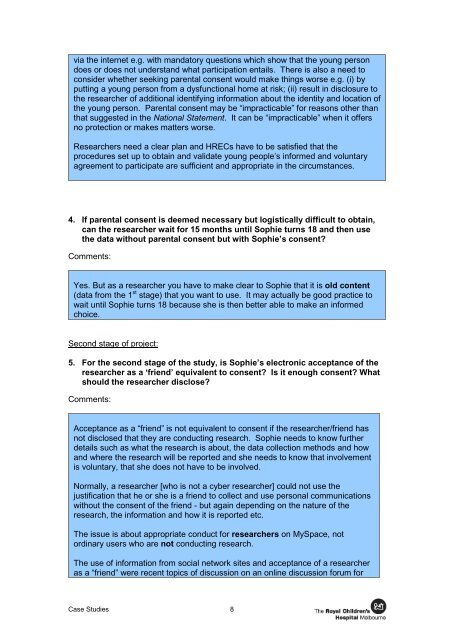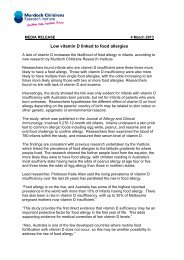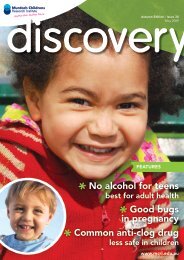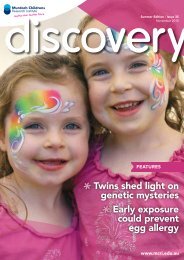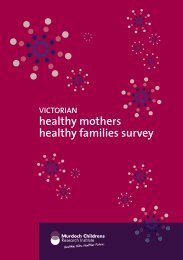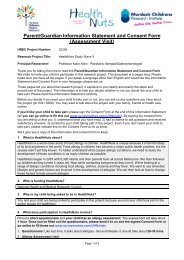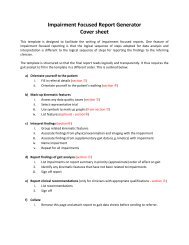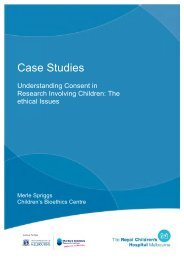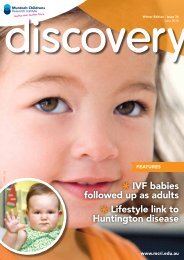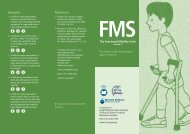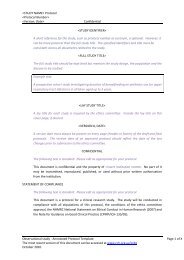Case studies: - Murdoch Childrens Research Institute
Case studies: - Murdoch Childrens Research Institute
Case studies: - Murdoch Childrens Research Institute
Create successful ePaper yourself
Turn your PDF publications into a flip-book with our unique Google optimized e-Paper software.
via the internet e.g. with mandatory questions which show that the young person<br />
does or does not understand what participation entails. There is also a need to<br />
consider whether seeking parental consent would make things worse e.g. (i) by<br />
putting a young person from a dysfunctional home at risk; (ii) result in disclosure to<br />
the researcher of additional identifying information about the identity and location of<br />
the young person. Parental consent may be “impracticable” for reasons other than<br />
that suggested in the National Statement. It can be “impracticable” when it offers<br />
no protection or makes matters worse.<br />
<strong>Research</strong>ers need a clear plan and HRECs have to be satisfied that the<br />
procedures set up to obtain and validate young people’s informed and voluntary<br />
agreement to participate are sufficient and appropriate in the circumstances.<br />
4. If parental consent is deemed necessary but logistically difficult to obtain,<br />
can the researcher wait for 15 months until Sophie turns 18 and then use<br />
the data without parental consent but with Sophie’s consent?<br />
Comments:<br />
Yes. But as a researcher you have to make clear to Sophie that it is old content<br />
(data from the 1 st stage) that you want to use. It may actually be good practice to<br />
wait until Sophie turns 18 because she is then better able to make an informed<br />
choice.<br />
Second stage of project:<br />
5. For the second stage of the study, is Sophie’s electronic acceptance of the<br />
researcher as a ‘friend’ equivalent to consent? Is it enough consent? What<br />
should the researcher disclose?<br />
Comments:<br />
Acceptance as a “friend” is not equivalent to consent if the researcher/friend has<br />
not disclosed that they are conducting research. Sophie needs to know further<br />
details such as what the research is about, the data collection methods and how<br />
and where the research will be reported and she needs to know that involvement<br />
is voluntary, that she does not have to be involved.<br />
Normally, a researcher [who is not a cyber researcher] could not use the<br />
justification that he or she is a friend to collect and use personal communications<br />
without the consent of the friend - but again depending on the nature of the<br />
research, the information and how it is reported etc.<br />
The issue is about appropriate conduct for researchers on MySpace, not<br />
ordinary users who are not conducting research.<br />
The use of information from social network sites and acceptance of a researcher<br />
as a “friend” were recent topics of discussion on an online discussion forum for<br />
<strong>Case</strong> Studies 8


